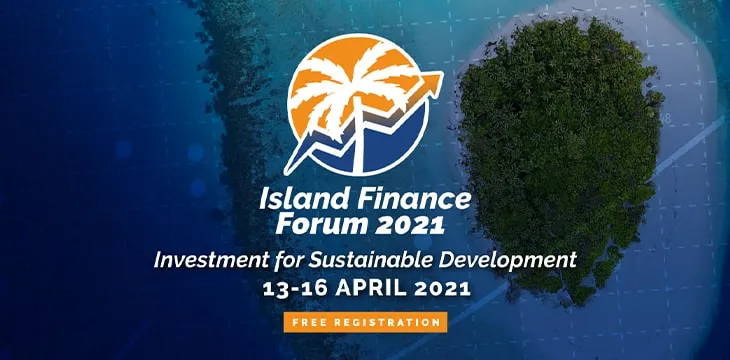|
Getting your Trinity Audio player ready...
|
Small island nations are “naturally decentralized” and could leverage this to spur blockchain adopition. Participants in the Island Innovation’s Island Finance Forum this week, which included Faiā‘s George Siosi Samuels, agreed that close-knit communities and even a lack of established digital services could work to these nations’ advantage in a “digital transformation.”
One of the most important factors in achieving success in their various projects was local involvement, all participants agreed. While it was possible for island nations with small, dispersed populations to “leapfrog” others in their digital ledger infrastructure, their solutions must be based on close community consultation and by studying their specific needs. This way, introducing a radical new technology would avoid being seen as a new form of colonization, or trying to shoehorn unsuitable solutions into skeptical markets.
Samuels appeared at the Forum to talk about the Tuvalu National Digital Ledger project, which Faiā is helping to build along with nChain and Elas Digital. Also speaking were Sharmyn Powell, Chief Risk Officer at the Eastern Caribbean Central Bank, Oxfam’s Blockchain Innovations and Cash Transfer Lead Sandra Uwantege Hart, and Bitt co-founder and CIO Simon Chantry.
Us panelists from yesterday's #islandfinanceforum2021. A really good, honest conversation about realities of #blockchain #crypto across the Pacific and Caribbean regions.
Thanks to @IslandsInnovate @jellsmoor for having us. pic.twitter.com/G13I5e6KpH
— George Siosi Samuels (@GeorgeSiosi) April 15, 2021
Samuels suggested Pacific Islands had in fact pioneered the earliest blockchain economies, referring to the community knowledge aspect of Yap stones. Though several aspects of the Yap stone story have been described as mythical by Dr. Craig Wright, the notion of a shared ledger for unmoving property does provide a relatable analogy for the way blockchains work.
Ironically, Samuels’ presentation at the Forum was the only one not specifically focused on payments and financial services. Tuvalu’s national digital ledger, he said, was for starters looking at digitizing government records and managing contracts with various other interests. These include fishing rights, the famous “dot-tv” internet domain, property and policing records, and Births, Deaths and Marriages.
The Bitcoin SV-based national ledger could lower corruption and mismanagement in the fisheries industry, he said, as well as improving transparency while maintaining individual privacy overall.
However “Bitcoin’s killer feature is micropayments,” Samuels added, noting that Tuvalu is “of course looking at central bank digital currency (CBDC) options.” The project chose Bitcoin BSV because it scales—he referred to Bitcoin as “a truth machine, but only if implemented as originally envisioned.”
Talking about the issues of implementing blockchain solutions in different jurisdictions, he also said that many overlook the fact that existing laws usually cover most of the concerns—though it may depend on the jurisdiction as to how. He agreed with the other panelists that the project is generational, and like similar others it could take 10-30 years to gain full acceptance.
Other ‘digital island projects’
Sharmyn Powell talked about the ECCB’s recent launch of “DCash,” a CBDC that is actually not blockchain-based, but one of the first in the world. A new pilot program began just this month, with DCash used as a parallel legal tender in the region that integrates with existing systems. Following the pilot, the ECCB will redeem and destroy the DCash units in order to conduct a usage audit.
Sandra Uwantege Hart is working with Vanuatu, a country close to Tuvalu and facing similar issues with lack of existing digital financial services, and an archipelago with logistical/communications problems and dispersed populations.
The blockchain-based project Oxfam is developing with Australian fintech firm Sempo is called “UnBlocked Cash.” It uses prepaid cards, mobile phones with “tap & pay,” and an informal vendor network. Blockchain records were good for aid transparency, helping to track where payments are going and also to track payments by category of vulnerability and timeframe.
Vanuatu’s first phase pilot was in 2019. Hart noted that the aim of the project was to grow organically, using existing community and cultural networks to spread, “the way people interact in an island context.” It has since spread to three countries including Papua New Guinea, and has raised over US$7 million in donor support.
In this time Vanuatu has also suffered crises including the Category 5 Cyclone Harold, a volcanic eruption, and damage to its vital tourism industry as a result of the COVID-19 crisis.
Back in the Caribbean, Bitt has for several years been consulting with governments and the ECCB through its other co-founder, Gabriel Abed. Simon Chantry said the company had initially launched as a digital asset exchange, but was now developing other applications including stablecoins and CBDCs.
Chantry also praised Bitcoin as the first “decentralized, permissionless” payment technology, and one that provides “internet-native payment rails” that overcame the inherent disadvantages of payment applications like PayPal and Stripe, which had to rely on legacy financial networks (or rails) and faced some of their same inefficiencies.
Energy efficiency, community involvement, and gaining trust
Participants had a healthy discussion on concerns related to proof-of-work‘s high energy usage. Samuels agreed that, at first glance, POW “can seem inefficient” but this would decrease as more people came to use them. He compared it to an erupting volcano, which can be wasteful and destructive, but ultimately creates new land.
Making a point that doesn’t get made often enough, the participants agreed that Bitcoin/blockchain seems to be unfairly singled out for its energy usage, but not other industries. They referred to pet rocks, fast food, and even Christmas lights as examples of energy seemingly “wasted” for frivolous purposes. Samuels noted the vast resources that go into producing the world’s toilet paper, despite there being other options. Chantry pointed out that the majority of electric power generated is wasted anyway, due to the need to maintain a baseload—which, although it appears contradictory, does increase efficiency overall.
Other common concerns were data security and privacy, the need for robust systems that could be counted on to function properly 24/7, and user-friendliness. Blockchain (and especially BSV) provides all this, and the close community consultation that all projects were undertaking was key to gaining their populations’ trust in the long run.
Island Innovation is an organization that seeks to “drive sustainable change across islands and rural areas around the world”. It does this by using the best practices and knowledge of island stakeholders to promote economic performance, political stability, and good governance.

 07-03-2025
07-03-2025 





